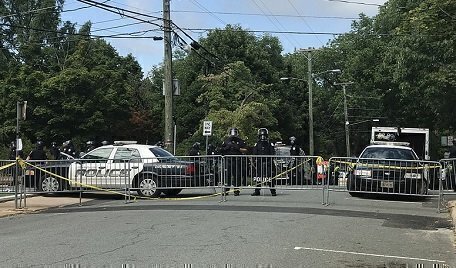A federal judge’s ruling earlier this week raises an interesting First Amendment question about the anonymous use of a digital social-sharing service to communicate controversial messages.
 In a 28-page ruling, Chief Magistrate Judge Joseph C. Spero from the United States District Court from the Northern District of California said the digital-services company Discord must provide the name of one of the alleged planners of the fatal 2017 Charlottesville “Unite The Right” rally to another federal court. But that user’s name must be held under strict confidential conditions as defined by that court.
In a 28-page ruling, Chief Magistrate Judge Joseph C. Spero from the United States District Court from the Northern District of California said the digital-services company Discord must provide the name of one of the alleged planners of the fatal 2017 Charlottesville “Unite The Right” rally to another federal court. But that user’s name must be held under strict confidential conditions as defined by that court.
Judge Spero had received a request to quash the subpoena for that information as part of a lawsuit in federal court in the United States District Court for the Western District of Virginia.
According to court documents, San Francisco-based Discord provides “private, invite-only ‘servers’” that allow users to message each other directly and in groups. On the company’s website, Discord promotes itself as an alternative to Skype and Team Speak for video gamers to communicate with each other, with 14 million daily users.
The nine plaintiffs in Sines v. Kessler, the Virginia case, claimed that an anonymous Discord user, known in court documents as Jane Doe and on Discord as “kristall.night.” conspired with at least 30 other people to commit violence at the “Unite The Right” rally. (Discord closed down that group’s access to the service immediately after the Charlottesville incident.)
The plaintiffs had been seeking messages from the group posted privately on Discord to confirm versions of those messages leaked on another website; they believed the leaked messages weren’t complete and didn’t include information needed to pursue the lawsuit in Virginia. The confirmed messages, the plaintiffs claimed, would prove the group undertook a “conspiratorial agreement” that was based “on religious and racial animus.” And the plaintiffs wanted the account information for Jane Doe.
Jane Doe filed the quash request on behalf of herself and other “similarly situated” Discord users. She acknowledged to the court that the group was part of the “alt-right” movement, but the subpoena request violated her First Amendment freedom of association rights, and that that disclosing her identity would expose Doe to physical harm due to her political beliefs.
Doe specifically said in the court documents that the plaintiffs were using the legal system to take part in a practice called “doxing,” or “exposing identifying information of, individuals active in the ‘alt-right’ community in order to publicly shame them.” In her filing, Doe claimed, “this fear will create a chilling effect on political speech, which is precisely what the First Amendment seeks to prevent.”
Doe also claimed the subpoena request violated the terms of the Stored Communications Act, which protects electronic documents stored on third-party computer servers on privacy grounds.
Judge Spero, in the ruling, agreed with Doe that the content of her stored messages could only be released to the Virginia court with her expressed consent and the consent of her Discord group. “Unless Plaintiffs receive consent from the recipients of Doe’s communications, or from the senders of messages sent to Doe, Discord is prohibited from disclosing to Plaintiffs any of Doe’s communications and documents,” Spero said.
But Spero also rejected the argument that the entire subpoena should be quashed. Because the Virginia court put a protective order in place to consider Doe’s account information as “highly confidential,” Spero said there were enough protections in place to balance Doe’s privacy concerns with the plaintiff’s need to prove their case.
“Discovering Doe’s account information is rationally related to obtaining evidence regarding the alleged violent conspiracy, including evidence of Defendants’ intent, because the leaked messages suggest that ‘kristall.night’ was, at least to some degree, a co-conspirator in planning the events on August 11 and 12. There is reason to believe that Doe could be an integral witness in the case, even if not named as a defendant,” Spero said.
Spero also addressed the broader constitutional questions the Virginia court will face as the case of Sines v. Kessler advances through the legal system.
“The Virginia Action is an important case that will likely continue to test the First Amendment’s boundaries. The Western District of Virginia will likely decide whether the speech at issue is truly political speech, or speech that incited violence and caused physical and emotional injury to Plaintiffs,” he concluded.
As of today, Doe’s attorneys were considering appealing Spero’s ruling, according to media reports.
Scott Bomboy is the editor in chief of the National Constitution Center.






